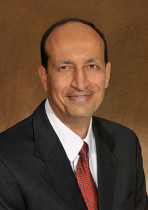Alshibli Helping Research Security of Stockpile
Professor Khalid Alshibli is joining 15 other researchers from an alliance of universities to establish a $16.5 million research center funded by the Department of Energy’s National Nuclear Security Administration (DOE/NNSA).
is joining 15 other researchers from an alliance of universities to establish a $16.5 million research center funded by the Department of Energy’s National Nuclear Security Administration (DOE/NNSA).
“It’s an honor to join other researchers for this valuable work that will help the national security mission of the US,” said Alshibli, who is also associate department head of graduate studies in the department.
The NNSA selected the team as one of nine new Predictive Science Academic Alliance Program III Centers to advance science-based modeling and simulation and exascale computing technologies. The objective of the center is to model the behavior of granular materials flow at multi-scales, which will help DOE to develop tools for safe handling and storage of high explosive materials and multi-functional additive manufacturing of cellular materials.
The project supports the stockpile stewardship program to ensure that the nuclear capabilities of the United States are not eroded as nuclear weapons age. As a geotechnical engineer with expertise in granular materials, Alshibli was invited to join experts in other universities to test and model the behavior of sand, specifically.
Part of the project is to develop experimental measurements enhanced by computational tools using world-class facilities at the Advanced Photon Source, Argonne National Laboratory, and DOE labs that will accurately predict how particulate materials respond to changes of temperature, flow, and loading at various strains.
The center will recruit and train the next generation of US graduate students to become experts in high-impact interdisciplinary research that is both critical and essential for the US nuclear security mission.
The University of Colorado at Boulder is lead institution on the project.